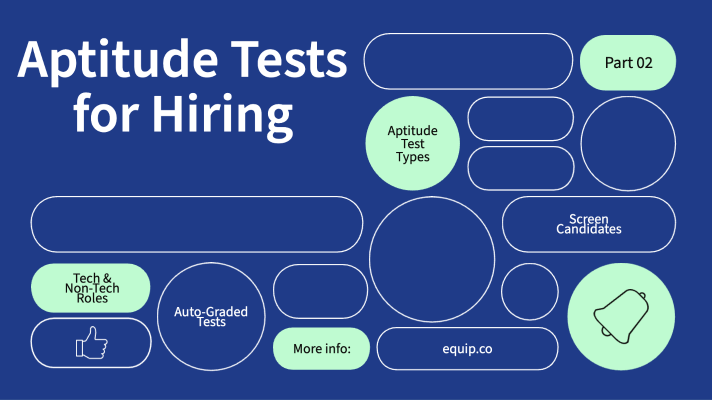
An aptitude test can be defined as a standardized assessment that’s designed to measure a person's natural abilities and potential for success in a particular field or job. These tests evaluate a person's cognitive abilities, problem-solving skills, and critical thinking.
The format of aptitude tests typically consists of multiple-choice questions, which are designed to be objective and unbiased, with the aim of providing an accurate and reliable measure of a person’s ability.
How important are aptitude tests in assessing and screening candidates for various skills?
According to a survey by Toggl, “64% of companies agree that skills testing initiates faster candidate screening, but only 40% have invested in a screening tool to manage high numbers of applicants.”
These tests, coupled with personality tests enable organizations to make fair and balanced decisions when it comes to hiring the right set of people.
Now that we have these numbers in order, let’s take a look at how recruiters can effectively use aptitude tests for hiring.
How to Use Aptitude Tests for Hiring? A Recruiter's Guide
Why Use Aptitude Test for Hiring?
Aptitude tests date back to the 19th century. Alfred Binet and Theodore Simon developed the first modern intelligence test in Paris, France in 1905. The test developed by them was called the Binet-Simon Scale, and it assisted in identifying children who needed special education.
Based on this test, Lewis Terman—an English psychologist, created the Stanford-Binet Intelligence Scale.
In 2023, aptitude tests are used in various settings, including education, employment, and career counselling. These tests come in many different formats like the SAT and ASVAB, including a ton of other tests that are used for other specific industries or professions.
An aptitude test is a suitable test type to assess a candidate’s competency for the following reasons:
1. Standardization: In most scenarios, aptitude tests are standardized in the sense that every candidate attempts specific questions for aptitude evaluation. This helps recruiters to benchmark the performance of all candidates against a set of predetermined criteria. Thus, all candidates are being evaluated fairly and objectively.
2. Predictive validity: Aptitude tests are designed to measure specific skills or abilities that are relevant to the job in question. Research has shown that these tests can be predictive of future job performance, making them a valuable tool for employers.
3. Efficiency: Tests that can be conducted for hundreds and thousands of candidates at the same time are thereby efficient in nature. Imagine being able to screen that many candidates in under an hour. This also allows companies to speed up their hiring process and allows candidates to witness their strengths and weaknesses.
4. Reduce bias: Objectivity is a great way to judge or assess a candidate’s performance as opposed to subjective factors like influence, and connections. Aptitude tests are built to measure objective factors such as logical reasoning and verbal ability.
How to Check Candidates’ Competency through an Aptitude Test?

Competence is defined as the combination of skills, knowledge, and behaviours that are absolutely important to perform at a job. Qualities one needs to be termed as competent at their job include technical skills, cognitive abilities, interpersonal skills, and personality traits.
Aptitude tests are designed to assess these abilities or skills in a candidate.
For instance, here are some of the skills that a competent Java Developer should ideally possess: concepts of object-oriented programming, data structures, Java frameworks such as Spring, Hibernate, Struts, and JavaServer Faces (JSF), web development, and database management.
For detailed skills for a Java Developer, check out the Job Description here: 15 Ready-to-Use Job Description Templates
Here’s how aptitude tests can help companies assess competency:
1. Define the job role: Clearly define the roles for different functions before proceeding further. This will allow you to curate tests for each function.
Aptitude tests do not have to be one size fits all. A programming aptitude test can consist of a developer's programming concepts with technical questions, whereas a generic logical aptitude test for a sales role can have standardized questions for logical and analytical ability.
2. Identify the types of aptitude tests: There are several aptitude tests types such as numerical, verbal, and abstract reasoning tests. Some roles that rely heavily on the use of mathematical operations would require you to create aptitude tests that assess numerical reasoning.
What’s imperative is that you curate these tests basis the role you’re hiring for. This is an important step as it will allow you to pick the candidates that best fit the bill.
3. Research the different tests available: There are many different aptitude tests available from various test publishers. In fact, now there are skill assessment platforms that recruiters and companies can choose from, and they don’t necessarily have to rely on traditional aptitude tests. It's vital for recruiters to research the different tests available and compare their content, format, and cost.
4. Consider the validity and reliability of the tests: Ensure that the tests you choose have been validated and are reliable. Look for evidence that the tests have been proven to predict job performance accurately. This can be easily achieved when shortlisting platforms that host automated assessments, by visiting various software review sites, looking at the success rate, and by discussing it with recruiters who may have used the platform.
Which Aptitude Test Should You Choose While Recruiting?
The choice of aptitude test for recruiters will depend on various factors, such as the job role, the skills required for the job, the organization's culture, and the desired outcomes of the recruitment process.
There are several aptitude tests available in the market, each designed to measure different abilities, such as cognitive abilities, personality traits, and job-specific skills. Some popular categories of aptitude tests used by recruiters include:
1. Cognitive ability tests: These tests measure a candidate's ability to process, analyze and solve problems. They include tests like numerical reasoning, verbal reasoning, and abstract reasoning tests.
2. Personality tests: These tests assess a candidate's personality traits, such as their communication style, leadership potential, and emotional intelligence.
3. Job-specific tests: These tests evaluate a candidate's job-specific skills, such as typing speed, programming abilities, or customer service skills.
Recruiters should choose an aptitude test that aligns with the job requirements and provides reliable and valid results. It is also essential to ensure that the test is fair and unbiased and does not discriminate against candidates based on their race, gender, or other personal characteristics.
While it is advisable to consult with experts in the field of psychometric testing or an industrial-organizational psychologist to select the most appropriate aptitude test for a particular recruitment process, there are also a plethora of platforms that assist with conducting automated pre-hiring assessments.
Platforms like Equip help recruiters create automated pre-hiring assessments for both tech and non-tech roles.
Read more: How Equip Helps Recruiters Automate Their Screening Processes
How to Evaluate Candidates through Aptitude Tests?

In fact, a study conducted by Salgado and Moscoso analyzed the correlation between cognitive ability and job performance and found that cognitive ability was a strong predictor of job performance across various occupations.
Additionally, they found that combining cognitive ability tests with other measures such as personality tests can improve the prediction of job performance.
The following are some strategies used by recruiters to evaluate candidates through aptitude tests:
1. Selecting the right test: The first step is to select the right aptitude test that aligns with the job requirements. For instance, a numerical reasoning test may be appropriate for a finance role, while a verbal reasoning test may be suitable for a content writer position.
2. Setting a benchmark: Recruiters often set a benchmark score for each aptitude test. Candidates who score above the benchmark are considered suitable for the job role.
3. Comparing results: Recruiters may compare a candidate's aptitude test results with other candidates who have applied for the same job role. This helps them to identify the top performers and shortlist them for further assessment.
4. Using a combination of tests: Recruiters may use a combination of aptitude tests to evaluate a candidate's overall suitability for a job role.
For example, a combination of verbal reasoning, numerical reasoning, and abstract reasoning tests may be used to evaluate a candidate for a managerial role.
5. Considering other factors: Aptitude test results are only one aspect of the recruitment process. Recruiters also consider other factors such as a candidate's work experience, education, and soft skills.
Read more: A Recruiters Definitive Guide to Aptitude Tests
Conclusion: Choosing the Right Aptitude Test

Now that we’re at the end of it all, it's pretty clear that there are multiple numbers and types of aptitude tests. This gives recruiters the opportunity to pick from a foray of tests that aligns with the various roles, and considerably reduces time by identifying the most suitable candidate.
Hence, choosing the right aptitude test can propel your hiring plans, push you in the right direction, and enable you to onboard the talent that best fits with the company. It’s vital to spend ample time picking the right tool.
If you’re looking to hire for multiple roles, consider picking a platform that will allow you to create tests for all types of roles, such as Equip.
